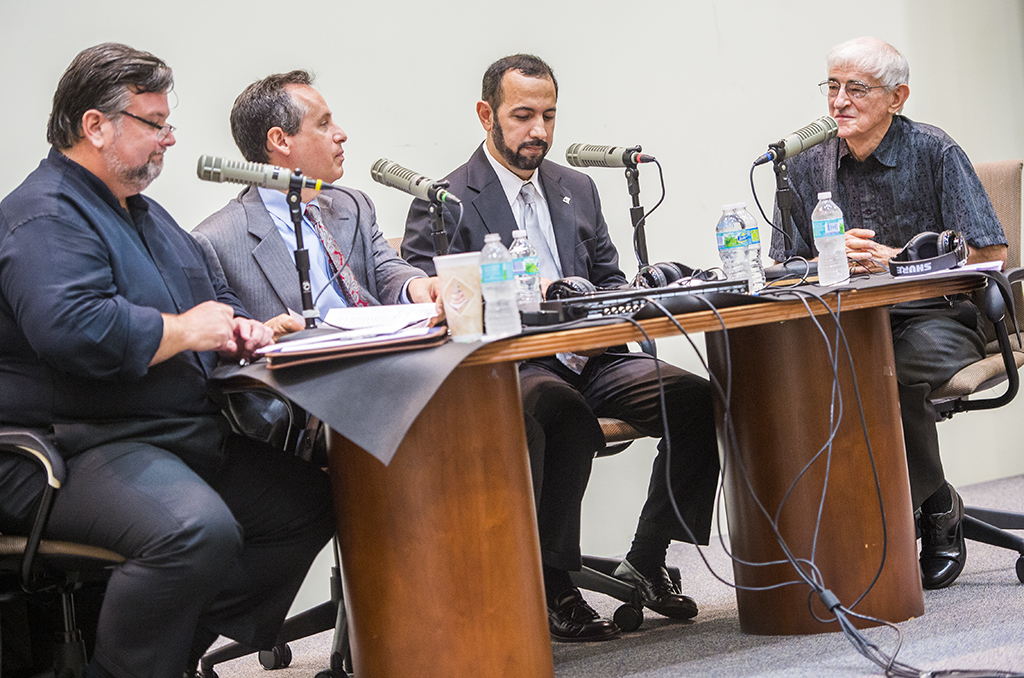Being a historical Jesus scholar, says former priest and Jesus historian John Dominic Crossan, is a little like being a journalist for the “Lower Galilee Gazette.”
As such, his beat is Jesus and he sifts through the Bible’s New Testament gospels — the books of Matthew, Mark, Luke and John — to learn as much as he can about Jesus, separating truth from myth, and comparing the Bible with other historical evidence. “You are not for Jesus and you are not against Jesus,” he told the students.
Crossan, one of the nation’s leading historical Jesus scholars, visited Valencia College’s West Campus on Thursday, Nov. 23, as a guest of the Interdisciplinary Honors Speakers Series. More than 200 students packed into an auditorium to hear Crossan and WMFE-FM’s Three Wise Guys — Rev. Bryan Fulwider, Rabbi Steven Engel and Imam Muhammad Musri — discuss Jesus, faith and interpretation of scriptures.
Asked whether Jesus performed miracles — including raising people from the dead — Crossan said that Jesus was a healer. “I’m convinced Jesus was a major healer, but what you’re getting in the Gospels are his publicity statements.” However, the New Testament stories about Jesus raising the dead are parables, he said.
Yet when it comes to John the Baptist baptizing Jesus, Crossan says he believes that the baptism really happened. “Mark admits it; John never mentions it,” says Crossan. Why? “The apostles are uncomfortable putting Jesus under John the Baptist.”
But the resurrection of Jesus, Crossan says, is a metaphor.
“Is this something that a news crew could film? Jesus rising from the dead? Or is it a metaphor?”
Christians, he argued, are sometimes too literal in their interpretation of the Bible. “I also believe that Jesus was the lamb of God. But I do not believe that Mary had a little lamb. It’s a metaphor!” Crossan exclaimed.
During the 90-minute event, the four panelists discussed a wide range of topics — from religious views on homosexuality, whether we should celebrate Dec. 25 as Jesus’s birthday, and what moral obligation Christians have to be good if Jesus died for their sins.
One student asked panelists if they believe they will go to heaven after they die.
“Heaven and hell are not places in the future; they’re places in the present,” Crossan told the audience. “If you want to know what hell is, read a history of the 20th century.”
While Islam believes there is a heaven, Engel, the rabbi, said Judaism downplays the idea of an afterlife. “We think there is an afterlife, but we don’t know what the furniture looks like there,” he said. “In Jewish tradition, we focus on the present life, not the afterlife.”
Fulwider, meanwhile, said he worries that many Christians focus too much on the afterlife, rather than being compassionate, kind and giving in the present.
Students were also curious about religious extremism, which Crossan says can be found in every religion. “Don’t focus on Islam extremism,” he said. “Every religion has it.”
Faith, he noted, is a lot like love. For example, he asked the audience to consider two grandparents. “If I show you a picture of my grandchild and say, ‘Isn’t this the most beautiful baby ever?’ you’re likely to smile, even if you think that your grandchild is the most beautiful baby on the planet. You’re not going to have a fistfight with him over whose grandchild is the most beautiful.” Likewise, he says, religious people shouldn’t get hung up on the notion that one religion is better than another.
But extremism is particularly disturbing to the mainstream Islamic community, Musri said. “It is very troubling to see young teens go without their parents’ permission off to join a fight that they know nothing about,” Musri said, noting that extremists are using the Internet to sway and recruit impressionable young people. “This is a battle for us,” he added. “Throughout time, we have seen politicians or people who seek power hijack that energy of believers and turn it into violence.”
Making matters worse, said Engel, is that most mainstream religion isn’t viewed favorably by many young people. “Mainstream religion doesn’t do a good job of reaching out to college-age people. All college students see is a religion that seems crazy and judgmental. We’re here to say that most religion isn’t like that.”
To hear the full discussion, tune in to WMFE-FM (90.7) on Dec. 2 and Dec. 9 for the segments on “Friends Talking Faith.” Click here to learn more the “Friends Talking Faith” radio show.

Comments are closed.